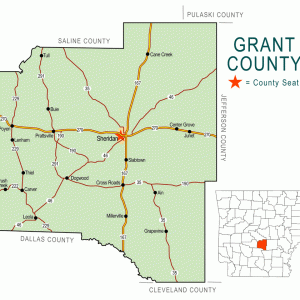calsfoundation@cals.org
Belfast (Grant County)
Belfast is an unincorporated community in Dekalb Township in northern Grant County. It is located along Arkansas Highway 35, seven miles north of Sheridan (Grant County) and ten miles south of Bauxite (Saline County). Belfast was an early pioneer settlement located in what was then southern Saline County, becoming part of Grant County in 1869. The community later relocated approximately four miles east, to be near the newly established railroad, and is often referred to as New Belfast or simply, Belfast. The original community of Belfast is now commonly referred to as Old Belfast, although no physical evidence of it remains.
The earliest settlers, arriving before 1840, established a small village situated near an excellent spring. Later, a two-story log structure built on site provided food, whiskey, and sleeping accommodations while serving as a stage stop on the Camden Trail connecting Camden (Ouachita County) and Little Rock (Pulaski County). According to local oral traditions, the community received the name Belfast from an Irish stage driver. On his first stop there, he ordered whiskey and was said to have exclaimed, “Be glory! I’ve found Belfast!” due to that Irish city’s reputation for excellent whiskey.
The Belfast post office was established in 1854 with John W. Dawdy as its first postmaster. A tannery and a store owned by W. T. Poe were present before 1860, followed by the Glover Sawmill in 1866, and later the Sam Hardin Mill in the early 1900s. During the Civil War, the Federal army retreated through the village following the Engagement at Jenkins’ Ferry on April 30, 1864, and was said to have ransacked each house and destroyed much in the way of personal property of its inhabitants. Afterward, Old Belfast remained a small, self-sufficient rural community. The post office was closed in 1866 but reopened in 1871 after the formation of Grant County from part of Saline and Jefferson counties in 1869.
Many residents began relocating four miles east (two miles east of the present-day Palestine community on Highway 35) beginning in 1878, and they continued to use the name Belfast for their new site. Most residents farmed, but many worked in the growing timber industry. With the arrival of the railroad in 1889, the post office and many other Belfast residents relocated to share in the economic opportunity of timber or railroad employment. The new community sat astride the Pine Bluff and Western Railway that was purchased by the St. Louis, Iron Mountain and Southern Railroad in 1909. This short line, financed by the Sawyer and Austin Lumber Company, ran from Pine Bluff (Jefferson County) through Sheridan to Benton (Saline County). Known to locals as the “Ponto Train,” it brought goods and mail each day to rural communities like Belfast and Detonti (Saline County).
The last use of the Old Belfast community was in 1914–1915 when it was occupied as a logging camp. The area of Old Belfast returned to a natural state and became covered in dense pine forests planted and harvested by timber companies. No visual or physical evidence of the village exists.
The first store, established by William T. Poe in 1866, was followed with two more by 1920, operated by Avan Busick and Jay Webb, respectively. Dr. Franklin Shepherd of Sheridan owned a drugstore, while Lewis Taylor operated a lumber mill/sawmill that provided a number of jobs for local inhabitants. Adjacent to the railroad depot was the railroad section house that served as living quarters for the railroad section crews. In 1912, the Belfast Missionary Baptist Church formed as the local house of worship.
Due to the consolidation of the local schools in the 1920s, the closing of the railroads, and improved local roadways, Belfast started to decline as inhabitants moved in search of employment in neighboring cities of Sheridan, Little Rock, and Pine Bluff. Many moved to the Bauxite/Benton/Bryant area of Saline County to work in the bauxite mines operated by Alcoa and Reynolds. By 1955, the postal service had established rural postal routes, resulting in the discontinuation of the Belfast post office. While some rural farmsteads remain, most of the land is owned by large timber corporations in the twenty-first century.
As a permanent connection to the original community, descendants of over 100 of the early settler families erected and dedicated an Old Belfast Pioneer Monument to the memory of their ancestors on April 13, 1974. Standing alongside the Old Camden Trail east of Tull (Grant County), it depicts the early history as well as lists the names of 108 of the families who called Belfast home. The area is utilized in the twenty-first century as a major supplier of timber.
For additional information:
Goolsby, Elwin L. Our Timberland Home: A History of Grant County. Little Rock: Rose Publishing Company, 1984.
Anthony Rushing
Benton, Arkansas
 Grant County Map
Grant County Map 




Comments
No comments on this entry yet.